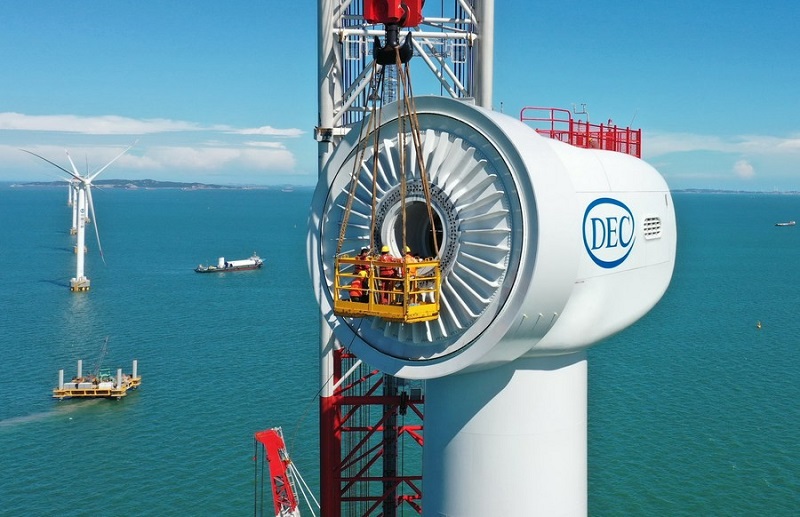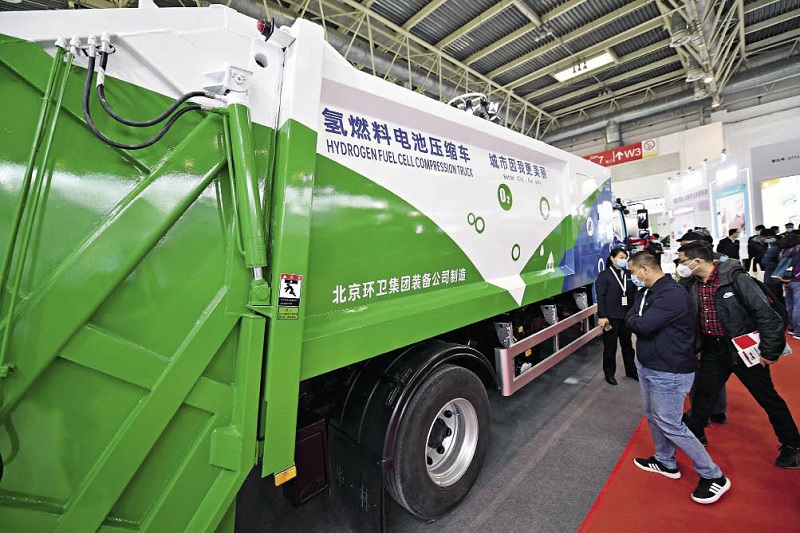Climate change is a real challenge facing all nations alike now. The temperature is rising in cities and various adverse effects including untimely rainfall, heatwaves, droughts, storms, floods, wildfires, and crop failures are being observed across the world.
It is really distressing that during the 26th session of the Conference of the Parties (COP26) to the United Nations Framework Convention on Climate Change from October 31 to November 13, 2021, held in Glasgow, Scotland, rich nations namely the United States and the European Union failed to live up to their pledge of providing $100 billion a year to help poor nations that are “dead with global warming”. It should be noted here that at the Copenhagen Climate Change summit in 2009, developed countries committed to a goal of mobilizing jointly $100 billion a year by 2020 to address the needs of poor and developing countries.
Biden’s criticism of China as a hindrance for a green future reminds us of an old adage — “rogues supplant justice”. Before boasting of “We showed up. We showed up,” can the U.S. President answer a simple but most crucial question: Which country yanked the Paris Climate Agreement in June 2017 and withdrew from it in November 2020? China or the United States?
The Paris Accord adopted on December 13, 2015, has been viewed as a “Magna Carta for the Earth” under which all countries agreed to limit global warming to 1.5 degrees Celsius by stepping up efforts with ambitious and strong plans to reduce greenhouse gas emissions. Has the current U.S. President ever pondered over that step of the past U.S. administration delayed the world from achieving its climate goals?
When the U.S. administration is pointing their fingers at China over climate-damaging emissions, the bitter truth is that the United States is the largest emitter of greenhouse gas per capita in the world. It has produced more than 400 billion metric tons of cumulative carbon dioxide emissions since 1750, according to a report published by U.S.-based Statista on November 5, 2021. With less than 5 percent of the world population, the U.S. still uses 25 percent of the world’s resources. According to the World Resources Institute, in 2018, the U.S per capita emissions were 16.85 tons, compared to China’s 7.56 tons which was less than half of those of the United States.
As such, instead of making only lip service promises to help the poorest countries cope with climate change, the United States “must earnestly meet its responsibilities and come up with specific emission reduction measures, and not try to divert attention and blame others” as demanded by China’s senior envoy to the United Nations Zhang Jun on November 4, 2021. The United States and some of its Western allies need to take an unbiased look at China’s actions and commitments on climate change.

Being the largest developing country and the second-largest economy in the world, China’s role in combating climate change and its possible effort to help the poorer nations to address climate change deserve much praise. It is important to note that in 2015, China pledged $3 billion for South-South Climate Cooperation Fund to fight climate change. Furthermore, China has provided more than 2,000 training opportunities for environmental protection officials, experts, and technicians from over 120 participating countries under the Belt and Road Initiative International Green Development Coalition.
Although China’s economy has been heavily dependent on domestic coal, China’s successive leaderships have taken pro-environment policies on climate governance, low-carbon development, and other environmental challenges over recent decades. Since the 18th CPC National Congress, China, under the leadership of Xi Jinping, has been on the road to building an ecological civilization with green development concepts such as “lucid waters and lush mountains are invaluable assets.” The Chinese President pledged to clean up smoggy skies, dirty rivers, and intoxicated soils by giving priority to ecology and green development while promoting high-quality economic development.
China’s striving for a green future is not a utopian ambition rather it has been reflected in China’s national development strategies and leaders’ statements. China’s 11th Five-Year Plan (2006-2010) set out the goal of “building a resource-conserving and environment-friendly society”. The 12th Five-Year Plan (2011-2015) stressed “green development”. The 13th Five-Year Plan (2016-2020) set the goal of improving the overall environment to support its goal of building a “Beautiful China” by 2035, prioritizing “green hills and clear waters.” On March 5, 2014, Chinese Premier Li Keqiang declared “war” on pollution at the National People’s Congress (NPC) and described smog as “nature’s red-light warning against inefficient and blind development.” Encouragingly, having stayed in line with the timetable outlined by the 13th Five-Year Plan (2016-2020), China successfully met its annual target for pollution control in 2018, with more blue skies, cleaner waters and greener mountains.

Aerial photo taken on Jun. 12, 2020 shows workers installing an offshore wind turbine at a wind farm in Fuqing, southeast China’s Fujian Province. (Photo/Xinhua)
China has fulfilled its CO2 cutting targets ahead of schedule. China had set the target of reducing CO2 emission per unit GDP by 40 percent from 2005 to 2020. In 2019, it was already 48.1 percent down.
President Xi vowed to speed up reforming the system for enhancing ecological advancement and continuing the “Beautiful China Initiative” in his historic report to the 19th National Congress of the CPC on October 18, 2017. Affirming China’s commitment to doubling up on green development, he said: “The modernization that we pursue is one characterized by harmonious coexistence between man and nature. We need also to provide more quality ecological goods to meet people’s ever-growing demands for a beautiful environment.”
Undoubtedly, the “Beautiful China Initiative” showcased China’s leadership’s determination with clear goals set as providing strong impetus toward global governance.
Over the past few years, China has taken decisive actions for curbing polluted air, water, and soil, which has significantly accelerated the promotion of ecological progress in China while playing a vital role in the country’s sustainable development. On September 22, 2020, when addressing at the 75th UN General Assembly, President Xi pledged to reach carbon peak before 2030 and to become carbon neutral by 2060.
It’s highly commendable that one year later on September 21, 2021, President Xi told the UN General Assembly that China will stop supporting coal power projects overseas under the Belt and Road Initiative (BRI). Xi’s announcement was hailed by UN Secretary-General Antonio Guterres by stating that “Accelerating the global phase-out of coal is the single most important step to keep the 1.5-degree goal of the Paris Agreement within reach.”
Undoubtedly, Xi’s commitment to stop building new coal projects abroad has demonstrated China’s conviction to become a leader in global climate actions.
According to the document titled “Working Guidance for Carbon Dioxide Peaking and Carbon Neutrality in Full and Faithful Implementation of the New Development Philosophy” jointly released by the CPC Central Committee and the State Council on October 24, 2021, China aims to gradually increase the share of non-fossil energy consumption to around 20 percent by 2025, around 25 percent by 2030, and over 80 percent by 2060, making the world’s biggest cut in carbon emission intensity in the shortest time frame in history.

A hydrogen fuel cell compression truck independently developed by Jinghuan Equipment, a subsidiary company of Beijing Environmental Sanitation Engineering Group, is launched on Nov. 13, 2020.
Furthermore, China leads the world in the development and utilization scale of renewable energy sources, providing strong support for green and low-carbon energy transformation. In 2020, China’s carbon intensity was 48.4 percent lower than that in 2005 meaning that China had more than fulfilled its commitment to the international community with a cumulative reduction of approximately 5.8 billion tons of carbon dioxide (CO2) emissions basically reversing the rapid growth.
According to the carbon neutrality targets announced by various countries, the United States will spend 43 years moving from carbon peak to carbon neutrality while China will only need about 30 years. Facts and figures prove that China, as one of the major stakeholders of the Paris Accord, has been constantly strengthening its climate targets through clarifying policy documents, gradually fleshing out its route to carbon peaking and carbon neutrality much earlier than promised.
In this COVID-configured world, all countries must understand this hard truth that environmental issues such as climate change, pollution, and the loss of biodiversity are not only domestic, social and economic problems of an individual country rather these are global challenges. They must be tackled collectively. Undoubtedly, China’s top-level design, national strategies, and unprecedented efforts for green development have set a good example of pollution prevention to the developing countries grappling with climate change, environmental pollution, and habitat depletion.
Now it is the time to make the world as green as possible. The climate change summitry is not all ambitious rhetoric as “blah, blah, blah” in Greta Thunberg’s words. It is essential for all countries to cooperate with each other in reaching the “net zero” targets for boosting global green development and should learn from each other instead of undermining each other or demonizing a certain country for climate change. As President Xi said in his written statement to the Glasgow COP26 summit on November 1: “I hope all parties will take stronger actions to jointly tackle the climate challenge and protect the planet, the shared home for us all.”